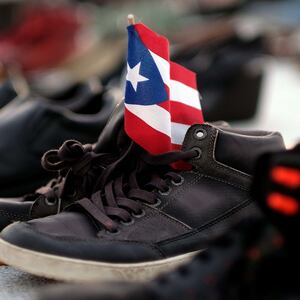The most aggressive attempt to restrict abortion access in Puerto Rico in decades came to a dramatic end this week when the bill’s author pulled it from consideration on the very last day of the legislative session. But women’s rights activists say the failed legislation is just the first of many threats to abortion access on the island.
The bill, written by Puerto Rico Sen. Nayda Venegas Brown, would have instituted a mandatory 48-hour waiting period for women seeking abortions, required parental consent for minors, and banned the procedure outright after 20 weeks gestation—restrictions that are common in many states in the continental U.S., but unheard of in Puerto Rico.
“In a nutshell, [the bill] radicalized completely how the termination of pregnancy is currently being done in Puerto Rico,” clinic administrator and obstetrician Yari Vale Moreno told The Daily Beast. “If this law had passed as it was originally written, we would have had three or four clinics closing in no time.”
But it did not pass as written. After months of campaigning by Vale and other advocates, a committee led by Senate President Thomas Rivera Schatz tacked on dozens of last-minute amendments this week. The committee slashed half of the bill’s 27 pages and removed references to a fetus as a “a whole, separate and unique life.”
Brown was not happy. She pulled the measure on Thursday—the last day of the session—without a vote, complaining that her colleagues had destroyed the “spirit of the bill.” The point of the legislation, she said, was to protect not just women but also “the unborn”—a mission she said the new bill did not uphold.
“I understand that all the projects suffer amendments and my project is not perfect, but there were too many amendments,” she told local newspaper El Vocero. Brown did not respond to the Daily Beast’s request for comment.
Puerto Rico already has laws on the books outlawing abortion, but they've been unenforceable since the Supreme Court's 1973 Roe v. Wade decision that legalized the procedure across the United States. These days, Puerto Rico allows the procedure at any time in a pregnancy as long as it is performed by a licensed provider.
“There are no abortion restrictions at the commonwealth level that we would normally think of in the United States,” Liza Fuentes, a senior research scientist for the Guttmacher Institute, told The Daily Beast. “There’s no waiting period, there's no parental consent. The Department of Health does require the clinic to obtain a license … and that's really it.”
So when doctors and clinic providers heard about Brown’s bill, which would have punished violators it with up to 15 years in prison, many were outraged.
Vale said she first heard about the issue in May from her colleagues at Taller Salud, a women’s health nonprofit where she’s a board member. After reviewing the legislation, Vale and her fellow board members quickly called a meeting of other doctors, psychologists and social workers to discuss it.
That initial meeting spawned what would become and island-wide, months-long campaign against the bill. The women staged marches, held public education sessions, and lobbied legislators in the capitol. They also launched a social media campaign and spread the word with old-fashioned paper fliers.
Earlier this month, a group called the Feminist Collective in Construction arrived at the capitol dressed as catrinas, or traditional Day of the Dead skeletons, carrying signs that read “Day of all of our Deaths” and “Clandestine abortion is femicide by the state.”
"This is a complaint against the [bill] by Senator Nayda Venega Brown, who intends to raise a series of obstacles and restrictions against women who decide to terminate the pregnancy," spokeswoman Shariana Ferrer told El Nuevo Dia. "We are remembering the women who have died in the midst of clandestine or unsafe abortions, we are today the catrinas for free abortion.”
By the time the legislative session ended this week, the women had submitted nearly 30 memorandums from different groups opposed to the bill. They also published an open letter from more than 70 organizations—including the ACLU of Puerto Rico and the College of Professional Social Workers—declaring their support for “free, secure and accessible” abortion services for the women of Puerto Rico.
Brown claimed on Thursday that the protesters had not influenced decision to pull the legislation and said she had asked the Senate president to return the bill to committee for further consideration when the new session starts in January.
"We have waited more than 70 years for a project like this and I'm not in a hurry,” she told El Vocero. “I want it to be a beautiful piece, a piece that women can feel protected and also the unborn.”
But with Brown’s legislation effectively defanged, the activists had already turned their attention to what they saw as larger problems affecting abortion access in Puerto Rico.
The biggest concern, advocates told The Daily Beast, is the number of clinics on the island. In the 1990s, Puerto Rico had 16 clinics, according to clinic administrator Myra Diaz. Now there are six. (The problem isn’t isolated to abortion clinics: The Health Resources and Services Administration estimated in 2016 that more than 19,000 island residents were living in “healthcare provider shortage areas.”)
Even more troubling, the providers said, is that half of the clinic operators on the island are over the age of 70. Because of the number of doctors leaving the island—six out of 10 general practitioners have left in the last three years alone, according to El Nuevo Dia—neither Diaz nor Vale are confident there would be providers to take over the clinics when the current owners retired.
“We had a huge problem with people leaving the island, even before [Hurricane] Maria. But after Maria we saw it even more,” Vale said. “The quality of life in Puerto Rico is getting worse as we face a lot of economic restrictions, so a lot of doctors have decided to move to the States.”
Last year’s hurricane also affected the clinic in other, more tangible ways. While recovery teams rushed to help hospitals after the storm, some of the island’s abortion clinics didn’t open their doors until two months later and then they faced the costs of rebuilding. Vale, whose clinic lost two air conditioning units and its entire heating system in the storm, said she had to cut her clinic hours and let go of some staff members to make up for the costs.
The storm also affected the patients—more specifically, their ability to pay. Nearly 40,000 of the island’s of 3.3. million residents lost their jobs in the first month after the storm, according to the Center for Economic and Policy Research. Even now, more than a year later, the economy has regained only 14,000 of those jobs.
The economic downswing makes it hard for residents to afford any type of healthcare, but abortion coverage is particularly difficult; because of federal laws, public insurance like Medicaid cannot be used to pay for the procedure. Nearly half of Puerto Rico’s population is on Medicaid.
As a result, Diaz said, “abortion in Puerto Rico is regulated, it’s safe, but it’s not accessible.”
The situation has the potential for international repercussions. Both Vale and Diaz said they regularly treat women from the Dominican Republic, where abortion is outlawed, or other Caribbean islands where it is heavily restricted or less safe. Vale said she receives about 20 patients from other islands each year; Diaz said her number is closer to 50. Neither woman knew where these patients would go if Puerto Rico’s clinics shut down.
Providers have other worries, including the cultural stigma around abortion, the lack of medical students interested in the practice and the threat of future anti-abortion legislation. Thanks to Brown’s bill, however, abortion-rights advocates say they now have a coalition of eager volunteers and a population ready to listen.
“We designed this national campaign to, yes, fight this bill, but also to be an eternal movement that won’t have an end,” Diaz said. ‘This issue hasn’t been talked about in so long. So now that we have the [people’s] attention, we might as well work on it.”








